Lee Rigby murder: Woolwich and Middleton face recovery
- Published
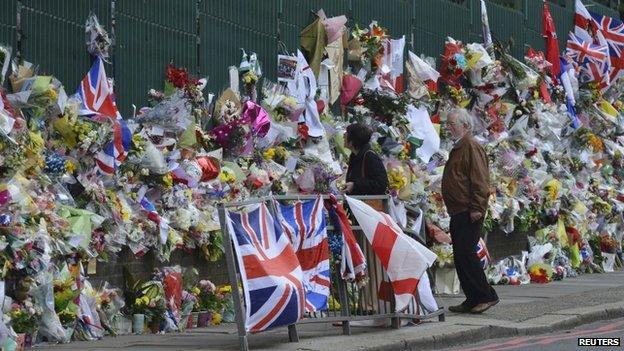
As two men are found guilty of the "cowardly and callous" murder of Fusilier Lee Rigby, what has the impact of the attack been on the area where it happened and the town he came from?
A traffic light junction on the South Circular in south-east London near Woolwich Barracks looks unremarkable, just as it did until 22 May.
But that day soldier Lee Rigby was rammed by two men in a car who then tried to decapitate him.
The crime scene and floral shrines have gone - as they have in Middleton, Greater Manchester, Fusilier Rigby's home.
For some, it is "business as usual" but for others the effects of fear and mistrust live large seven months on.
Woolwich
In the days after the murder, the Reverend Jesse van der Valk, the Church of England rector of Woolwich, started a petition to honour the three women who confronted Michael Adebolajo and Michael Adebowale, with George medals for bravery.
It received nearly 90,000 signatures before it was lodged with the Cabinet Office for consideration.
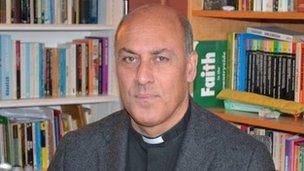
The rector of Woolwich, the Revernend Jesse van der Valk, said Lee Rigby would never be forgotten
Amanda Donnelly and her daughter Gemma Donnelly-Martin sat with Fusilier Rigby in his last moments, and Ingrid Loyau-Kennett confronted the killers.
"They changed the story to one of love and courage which is far more powerful than the story the killers wanted to put across," said Mr van der Valk.
He feels that although the community has come to terms with what happened, passing the spot where Fusilier Rigby was killed will always evoke memories. The reverend said he believed the community as a whole would like a memorial to him.
"No-one's going to forget about Lee Rigby as they've never forgotten about Stephen Lawrence who was killed only three miles away," he said.
'Everybody was scared'
Mother-of-two Muna, 33, was born in Somalia and has lived in Woolwich since 1996.
Asked how Woolwich has changed, she said: "I think people are quieter and more humble. When it happened everybody was scared."
The Muslim mother said the backlash against the murder falsely carried out in the name of Islam included abuse against people of her religion.
"My family said going out in a hijab was too dangerous at first," she said.
"For about two or three weeks we didn't go out. It's better now."
Dr David Dixon, head teacher of Mulgrave Primary School which is a few hundred yards from the murder scene, said the community had "come together really well".
The school has 49 different languages spoken and a lot of children of Army parents, he said.
"The children didn't see anything at the time because we made sure they wouldn't be able to," he said.
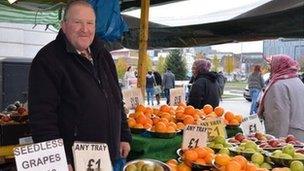
Market trader Derek Williams said some customers were scared for a while to wear veils in public
"It's been a case of explaining things to the different age groups."
He said things had returned to "business as usual" which was a "testament to the community".
Derek Williams has worked on Woolwich Market for 38 years. He could hear the shots that police fired at the killers.
"It was disgraceful but life goes on," he said.
"One or two Muslim customers were unhappy about coming out just afterwards but they've come out now. Everyone knows it's an isolated incident that went to the extreme," he said.
But Michael Ryan, 62, who was born in Woolwich, said trust had gone since the murder.
"We don't know who to trust. People are a lot more wary," he said.
He said the murder had highlighted the racial tensions in the area.
"For those two that day, religion was an excuse to do what they had done. They are just criminals. It was an abhorrent thing. I think it will take a long time to heal."
Middleton
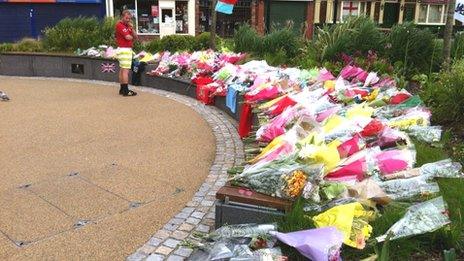
People laid flowers in the centre of Lee Rigby's hometown after the attack
The support Fusilier Lee Rigby's family received from the community was "incredible", his stepfather Ian said in July, after spending weeks unable to get into his garden because it was full of flowers brought by well-wishers.
The soldier's uncle Ray Dutton said the family have been moved not just by the high-profile charity events organised in his memory all over the world, but by the small personal gestures made by people of all ages and backgrounds.
"The community has been absolutely amazing," he said.
"Obviously the first few days were very, very hard.
"I was at Ian's doorstep at about 9pm on the second night after [Lee's] death and a young army cadet, no more than 10 or 11 years of age in full battle dress walked up to the door, saluted Ian and myself, laid down flowers, saluted and walked away.
"The little things like that are the touching things really."
Within days a memorial garden had sprung up in the soldier's hometown of Middleton, as people left flowers, messages and gifts.
"All the little mementoes around the memorial garden in Middleton; all those little things have been kept in a box and hopefully will be handed over to [Lee's son] Jack as he get older," Mr Dutton said.
The Middleton community has been 'amazing', uncle Ray Dutton said
"So he'll realise how people thought about his dad and what he gave to the country, and his memory will live on without a doubt."
The day after his murder, families packed into a prayer service at the Burnside Community Centre in Middleton's Langley estate - where the soldier grew up - to light candles in his memory.
Drawn together in grief, the community has remained much closer ever since, says centre manager Joan Aspinall.
"It was a good place to get together - it's made everyone rally round and start asking others if they need any help," she said.
"Now people are volunteering more at the centre, people seem to be more willing to talk about their problems.
"There's more community spirit, people are looking after each other."
Charity nights in memory of Fusilier Rigby have now become regular events in the area.
'Extremely emotional'
In October the Band of the Royal Regiment of Fusiliers performed a special charity concert in Bolton, attended by the soldier's family, which will now become an annual event.
Organiser Ann-Marie Etherington said: "It was extremely emotional for his mum - it's the music Lee would have performed himself.
"In court watching the horrific evidence the family have maintained their dignity throughout and more has to be done to help these families."
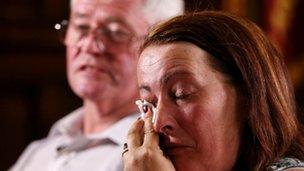
Lee Rigby's mother Lyn and stepfather Ian said they had received "incredible" support
Rochdale Council is in talks with Fusilier Rigby's family about plans for a permanent memorial in his honour.
Col Mike Glover said the Lancashire Royal Regiment of Fusiliers had been overwhelmed with cards and books of condolence all over the UK.
"There's been a tremendous groundswell of sympathy," he said.
"People have been reminded that being a soldier there's a lot more to it, they don't just get killed on operations.
"If there could be a memorial to all the victims of terrorism I think Lee Rigby would have been more than happy with that - his death could remind people that throughout the world similar situations are going on."
- Published19 December 2013
- Published19 December 2013
- Published19 December 2013
- Published19 December 2013
- Published26 February 2014
- Published19 December 2013
- Published19 December 2013